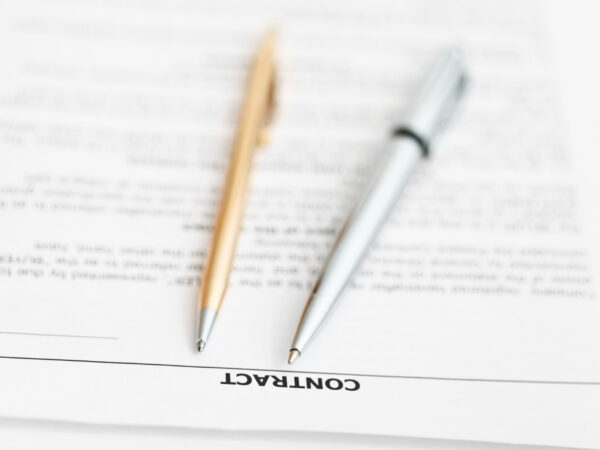Having a well-drafted contract is a crucial part of the business sales process, specifically if your interests are compromised. To ensure a smooth and safe sale transaction, it’s important to understand the main aspects that a business sale contract should cover.
In this blog, we’ll explore the essential elements that should be included in a sale agreement to safeguard your rights and minimise potential risks.
What is a business sale contract?
A business sale agreement is the main legally binding document involved in selling a business. The business seller usually prepares the contract for sale, which sets out terms relating to the aspects of a sale, like the sale price, dispute resolution processes, and what assets are included.
What should be included in a contract for the sale of a business?

In the sale of a business contract, it is important to ensure that both the buyer and the seller have all their negotiated interests, rights and obligations represented. It should also provide clear steps for resolving all types of potential disputes. This aspect of the contract significantly helps to reduce the likelihood of messy litigation down the line.
So, while every business sale is unique, there are some elements of a business sale contract that shouldn’t be missed; this includes:
1. Parties
You need to include the names and/or company names and details of the seller and buyer involved in the business sale.
2. Sale price
Negotiating the value of different assets when coming up with a sale price is common, and engaging a valuation expert can be a huge help. The final, agreed purchase price will be based on the unique business assets listed, which usually fall into two key categories:
Goodwill
These are the intangible assets of a business, including things like a business’s reputation, location, brand identity and customer list.
Physical assets
These are the tangible assets of a business, including things like stock, equipment, machinery, vehicles, and real property.
3. List of assets
Once values have been negotiated, a list of every essential business assets should be included in the business sale contract. Some of the most common assets included in a business sale contract include:
- Customer and supplier contracts
- Equipment
- Inventory
- Real estate
- Business name/s
- Websites
- Various business technologies
- Intellectual property (IP)
- Business records
- Staff.
4. Warranties and representations
Warranties and representations in a business sale contract are designed to protect both parties from each other’s conduct, particularly relating to the accuracy of things like financial records and the legal business structure.
5. Business protection
Non-compete, confidentiality and guarantee clauses help to prevent a seller from starting a competing business, disclosing sensitive information to third parties and making false claims and representations without legal consequences.
How to write a contract for sale – seven tips
When writing a business sale contract, clarity and precision are key; therefore, the assistance of legal professionals with experience in business sales to draft and review the contract will ensure that the interests of both the buyer and the seller are protected now and in the future.

Here are our top seven tips for writing an effective contract for sale:
- Use clear language: Write in straightforward language that both parties can easily understand and avoid legal jargon or terms that are too complex.
- Be specific: Clearly define all specific terms to avoid any misunderstandings, including the business being sold, payment details, and any conditions that must be met before the sale can proceed.
- Outline responsibilities: Include any obligations or responsibilities that both seller and buyer must fulfil before and after the sale.
- Include contingencies: Consider including contingencies that allow for changes in circumstances, such as financing approval or inspections. This provides flexibility and protects both parties.
- Address liabilities: Include provisions that address any potential liabilities or claims related to the business. This protects the buyer from unforeseen issues that may arise after the sale.
- Review and revise: Before finalising the contract, review it several times with all parties involved. Make necessary revisions to ensure that everyone agrees with the terms.
- Sign and date: Ensure that both parties sign and date the contract to make it legally binding and keep copies for your records.
Who draws up the contract for a business sale?
In Australia, the ones who are usually in charge of drafting a business sale contract are lawyers or legal firms specialising in business law. Both the buyer and the seller may engage their own legal representatives to review and negotiate the contract to protect their respective interests.
Common mistakes in business sale contracts
It’s crucial to avoid mistakes in sale contracts, mainly to protect the interests of both the buyer and the seller. Here are some common mistakes to avoid:

1. Failing to define the scope of the sale clearly
The contract should clearly specify what is being sold, including all assets, liabilities, and intellectual property. Ambiguity in this area can lead to disputes down the line.
2. Neglecting to include key terms and conditions
The contract should cover all essential elements, such as the purchase price, payment terms, representations and warranties, and indemnification. Leaving out any of these key terms can create uncertainty and potential disputes.
3. Using ambiguous or unclear language
Using vague or confusing language in the contract can lead to misunderstandings and disputes. It’s important to use clear terms that both parties can easily understand.
4. Not obtaining necessary approvals or consents
Depending on the nature of the business and the parties involved, the sale may require certain approvals or consents, such as from shareholders, lenders, or regulatory bodies. Failing to obtain these approvals can delay or even derail the sale.
5. Neglecting to address potential liabilities or claims
The contract should include provisions that address any potential liabilities or claims related to the business, such as outstanding debts, legal disputes, or environmental issues. Failing to address these potential risks can leave the buyer vulnerable to unexpected costs or liabilities after the sale.
By avoiding these common mistakes and working with experienced legal professionals, you can create a comprehensive and effective business sale contract that facilitates a successful transaction.
Conclusion

A well-structured business sale contract is essential for a smooth and legally sound transaction in Sydney. If you’re buying or selling a business in Australia, contact us today to learn more about how we can assist you with reviewing and/or drafting a comprehensive agreement to purchase a business.
At H+A Legal, our experienced business law team understands the complexities of business sale contracts. It can guide you through the process, from drafting the contract to resolving any disputes that may arise.
Remember, we’re not just your legal advisors – we’re your business partners dedicated to empowering your business success.



